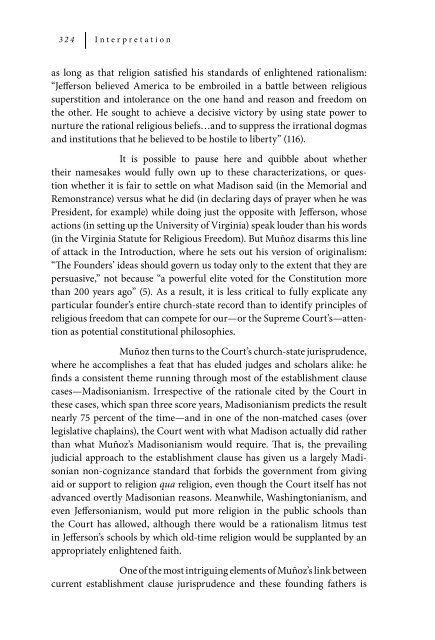Spring 2010 - Interpretation
Spring 2010 - Interpretation
Spring 2010 - Interpretation
You also want an ePaper? Increase the reach of your titles
YUMPU automatically turns print PDFs into web optimized ePapers that Google loves.
3 2 4<br />
I n t e r p r e t a t i o n<br />
as long as that religion satisfied his standards of enlightened rationalism:<br />
“Jefferson believed America to be embroiled in a battle between religious<br />
superstition and intolerance on the one hand and reason and freedom on<br />
the other. He sought to achieve a decisive victory by using state power to<br />
nurture the rational religious beliefs…and to suppress the irrational dogmas<br />
and institutions that he believed to be hostile to liberty” (116).<br />
It is possible to pause here and quibble about whether<br />
their namesakes would fully own up to these characterizations, or question<br />
whether it is fair to settle on what Madison said (in the Memorial and<br />
Remonstrance) versus what he did (in declaring days of prayer when he was<br />
President, for example) while doing just the opposite with Jefferson, whose<br />
actions (in setting up the University of Virginia) speak louder than his words<br />
(in the Virginia Statute for Religious Freedom). But Muñoz disarms this line<br />
of attack in the Introduction, where he sets out his version of originalism:<br />
“The Founders’ ideas should govern us today only to the extent that they are<br />
persuasive,” not because “a powerful elite voted for the Constitution more<br />
than 200 years ago” (5). As a result, it is less critical to fully explicate any<br />
particular founder’s entire church-state record than to identify principles of<br />
religious freedom that can compete for our—or the Supreme Court’s—attention<br />
as potential constitutional philosophies.<br />
Muñoz then turns to the Court’s church-state jurisprudence,<br />
where he accomplishes a feat that has eluded judges and scholars alike: he<br />
finds a consistent theme running through most of the establishment clause<br />
cases—Madisonianism. Irrespective of the rationale cited by the Court in<br />
these cases, which span three score years, Madisonianism predicts the result<br />
nearly 75 percent of the time—and in one of the non-matched cases (over<br />
legislative chaplains), the Court went with what Madison actually did rather<br />
than what Muñoz’s Madisonianism would require. That is, the prevailing<br />
judicial approach to the establishment clause has given us a largely Madisonian<br />
non-cognizance standard that forbids the government from giving<br />
aid or support to religion qua religion, even though the Court itself has not<br />
advanced overtly Madisonian reasons. Meanwhile, Washingtonianism, and<br />
even Jeffersonianism, would put more religion in the public schools than<br />
the Court has allowed, although there would be a rationalism litmus test<br />
in Jefferson’s schools by which old-time religion would be supplanted by an<br />
appropriately enlightened faith.<br />
One of the most intriguing elements of Muñoz’s link between<br />
current establishment clause jurisprudence and these founding fathers is
















